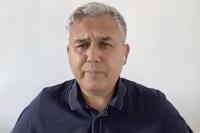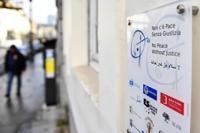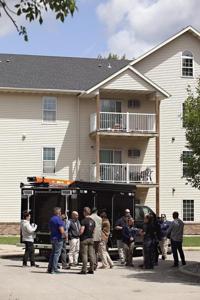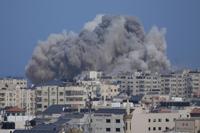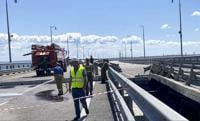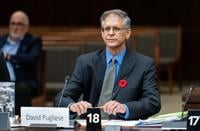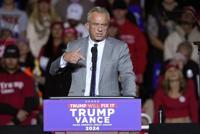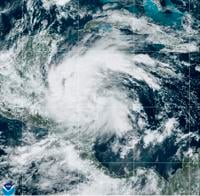LONDON (AP) — On Oct. 14, a Russian engineer named Gleb Karakulov boarded a flight from Kazakhstan to Turkey with his wife and daughter. He switched off his phone to shut out the crescendo of urgent, enraged messages, said goodbye to his life in Russia and tried to calm his fast-beating heart.
But this was no ordinary Russian defector. Karakulov was an officer in President Vladimir Putin’s secretive elite personal security service — one of the few Russians to flee and go public who have rank, as well as knowledge of intimate details of Putin’s life and potentially classified information.
Karakulov, who was responsible for secure communications, said moral opposition to Russia’s invasion of Ukraine and his fear of dying there drove him to speak out, despite the risks to himself and his family.
“Our president has become a war criminal,” he said. “It’s time to end this war and stop being silent.”
Karakulov’s account generally conforms with others that paint the Russian president as a once charismatic but increasingly isolated leader, who doesn’t use a cellphone or the internet and insists on access to Russian state television wherever he goes.
He also offered new details about how Putin’s paranoia appears to have deepened since his decision to invade Ukraine in February 2022. Putin now prefers to avoid airplanes and travel on a special armored train, he said, and he ordered a bunker at the Russian Embassy in Kazakhstan outfitted with a secure communications line in October — the first time Karakulov had ever fielded such a request.
A defection like Karakulov’s “has a very great level of interest,” said an official with a security background from a NATO country, who spoke on condition of anonymity to discuss sensitive political matters.
“That would be seen as a very serious blow to the president himself because he is extremely keen on his security, and his security is compromised,” he said.
The Kremlin did not respond to requests for comment. Neither did Karakulov’s father or brother.
As an engineer in a field unit of the presidential communications department of the Federal Protective Service, or FSO, Karakulov was responsible for setting up secure communications for the Russian president and prime minister wherever they went. While he was not a confidant of Putin’s, Karakulov spent years in his service, observing him from unusually close quarters from 2009 through late 2022.
Karakulov, his wife and his child have gone underground, and it was impossible to speak with them directly due to security constraints.
, a London-based investigative group funded by Russian opposition figure Mikhail Khodorkovsky, interviewed Karakulov multiple times and shared video and transcripts of more than six hours of those interviews with The Associated Press, as well as the , , and .
The Dossier Center confirmed the authenticity of Karakulov’s passport and FSO work identity card, and cross-checked details of his biography against Russian government records, leaked personal data and social media postings, all of which the AP reviewed.
The AP also independently confirmed Karakulov’s identity with three sources in the U.S. and Europe and corroborated his personal details, including passport numbers, date and place of birth, two registered addresses, and the names and ages of family members. The AP was unable to verify all details of his defection.
The AP also confirmed that Karakulov is listed as a wanted man in the Russian Interior Ministry’s public database of criminal suspects. The ministry initiated a criminal investigation against Karakulov on Oct. 26 for desertion during a time of military mobilization, according to documents obtained by the Dossier Center and seen by the AP.
The FSO is one of the most secretive branches of Russia’s security services.
“Even when they quit, they never talk, but they know a lot of details of the private life of the president and the prime minister,” said Katya Hakim, a senior researcher at the Dossier Center.
Karakulov moved as part of an advance team, often with enough specialized communications equipment to fill a KAMAZ truck. He said he has taken more than 180 trips with the Russian president, and contrary to widespread speculation, Putin appears to be in better shape than most people his age. Putin has only canceled a few trips due to illness, he said.
Unlike the prime minister, Putin does not require secure internet access on his trips, Karakulov said.
“I have never seen him with a mobile phone,” he said. “All the information he receives is only from people close to him. That is, he lives in a kind of information vacuum.”
Karakulov’s work brought him to luxury hotels for summits, beach resorts in Cuba, yachts — and aboard a special armored train outfitted for the Russian president.
Putin’s train looks like any other, painted gray with a red stripe to blend in with other railway carriages in Russia. Putin didn’t like the fact that airplanes can be tracked, preferring the stealth of a nondescript train car, Karakulov said.
“I understand that he’s simply afraid,” he said.
Putin began to use the train regularly in the run-up to the February 2022 invasion of Ukraine, Karakulov said. Even last year, Putin continued to insist on strict anti-COVID-19 measures, and FSO employees took shifts in two-week quarantine so there would always be a pool of people cleared to travel with Putin on the train, he said.
Putin has set up identical offices in multiple locations, with matching details down to the desk and wall hangings, and official reports sometimes say he’s one place when he is actually in another, according to Karakulov and prior reporting by a Russian media outlet.
When Putin was in Sochi, security officials would deliberately pretend he was leaving, bringing in a plane and sending off a motorcade, when he was in fact staying, Karakulov said.
“I think that this is an attempt to confuse, first, intelligence, and second, so that there are no assassination attempts,” he said.
Karakulov’s defection was a surprising turn for a family steeped in patriotic military tradition. Karakulov’s father is a former military man, and his brother is a local government official.
Karakulov said he couldn’t tell his parents about his disillusionment, because their minds had been molded by years of watching Russian state television. So he never told them he was leaving.
But he denies that he is unpatriotic and urged others to break their silence to stop the war.
“Patriotism is when you love your country,” he said. “In this case, our homeland needs to be saved because something crazy and terrible is happening.”
___
Associated Press reporters Jamey Keaten in Geneva, Aamer Madhani in Washington and Joanna Kozlowska in London contributed to this report.


